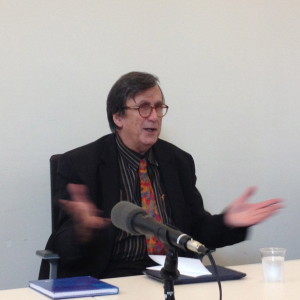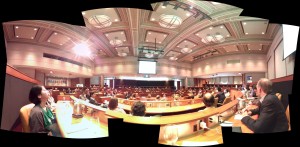Bruno Latour has influenced my thinking quite a bit. So you can imagine the disappointment I felt when I realized that teaching responsibilities would prevent me from attending the public lecture he gave last night at the Vogue (I heard it was good, although the questions from the crowd were embarrassing). Luckily, I was able to participate in a more intimate conversation with him today at the Centre for Interactive Research on Sustainability (well, lucky the event took place; less lucky for being invited since I helped organize it ;-) The conversation’s title was Sustainability and the Social Imaginaire, and it was organized by the Stonehouse Initiative.

Latour was personable and funny. I was a bit surprised by his lengthy discussion of Walter Lippmann’s critique of the mass media (funny enough, I refer to Lippmann’s deriding of democracy as an El Dorado in both teaching and dissertation), but that was not the only surprise. While most of the conversation revolved around the difficulty of addressing the ecological crisis without science or religion functioning as an ontological referee – a position Latour helped popularize – his more practical suggestions seemed strangely familiar. Instead of accusing climate deniers of being irrational, he said, we need to unmask their true colours and figure out what kind of ontological positions they represent (by asking them to draw cosmograms, perhaps?). This will allow us to create a common basis for debating the issues more clearly – instead of arguing about the facts we can air our concerns (to use his earlier vocabulary). Science may provide us with possible explanations of the underlying issues but cannot adjudicate what is essentially a political process (in Rorty’s terms, we should not expect science to offer us a “redemptive truth”).
While Latour’s position is central to at least one project I’m currently involved in (and on which I promise to write in the future), I still have problems translating (yes, lame pun, I know…) his ideas into political vernacular. Furthermore, his suggestions sounded a lot like a recommendation of political economy: unmask your rivals, trace their interests and influence, and so forth. So, to perform a little intellectual jiu-jitsu and redirect the critique he and Serres launched at phenomenology in their Conversations on Science, Technology and Time, does the complex apparatus he builds in order to destabilize the ontological and epistemological regime of science merely serves to proffer a commonsensical advice to be critical of the media? And how are we to decide who seeks to deceive us? Are our responses to climate change to remain the subject of an arithmetic of power? And does this not represent a change in his approach to ideology and its (largely Marxian) critique? Well, I had to ask, and, as expected, he rejected the premise of the question (that trickster!), but I remain slightly unsatisfied. Shouldn’t the translation of Latourian principles into political action yield more than the acknowledgment that, at the end of the day, political-economic power wins?

